
Back in the 1970s, the joke was that run-down Glasgow was Disneyland. "Aye, because this disnae work, and that disnae work. . . . " Well, we all live in Disnaeland now.
You voted for Brexit? You ended up with Theresa May and now three options — her deal, no deal or some other deal (involving Norway) — none of which has a majority in either the Commons or the country, implying another three options: another Tory leader, another referendum, or another general election.
You voted for Donald Trump? You ended up with Nancy Pelosi back in charge of the House and Robert Mueller rounding up the suspects.
You voted for Emmanuel Macron? You ended up with the Yellow Vests smashing up the Arc de Triomphe.
As 2018 draws to a less than happy close, it's tempting simply to conclude that nothing works. Populism doesn't work. Centrism doesn't either.
What turned our earth into Disnaeworld? My answer to the world's democratic leaders is that you really cannot win — for seven reasons:
1. You can't do anything about demographics, and for most democracies the demographics are terrible.
2. You have inherited welfare systems that transfer resources from younger to older voters, but the latter tend to be more numerous and turn out more in elections, so you can't reform them and survive.
3. Your safety valve is that you can borrow from the bond market and interest rates are very low, but that's now changing, and you can't do anything about it, because central banks are independent.
4. Your aging population means that there's an economic demand for foreign labor and foreign students, but immigration is politically unpopular, even when the immigrants come from northern Europe (e.g., Poland) and genuinely relieve skill shortages.
5. You might just be able to overcome these problems if there were a real external threat, but the truth is that ordinary people just aren't that scared of Vladimir Putin or Xi Jinping, much less Kim Jong Un.
6. As for climate change, ask President Macron how his proposed fuel tax is going.
7. Finally, social media have made it almost impossible for you to control the narrative. You can tweet to your heart's content, but you are firing a water pistol into an ocean of extreme views and fake news.
So politics is a doomed venture. The best performing democratic leader at the G-20 in terms of longevity and popularity was Angela Merkel (13 years, 50 percent approval), the worst Macron (one year, 26 percent and falling). That is because Merkel long ago learned that the key to popularity is always to take the line of least resistance. She's a strategic disaster but a tactical genius.
Brazil is a good illustration. People hope (as do I) that incoming President Jair Bolsonaro and his Chicago-trained finance minister, Paulo Guedes, will reform pensions, simplify taxes, slash red tape, and stabilize the debt. The reality check — when these hopes encounter the swamp that is the Brazilian congress — lies ahead.
Can Bolsonaro avoid the fate of Argentina's Mauricio Macri, who was the toast of the town after his 2015 election victory and now has a 35 percent approval rating and a nasty recession on his hands? Maybe, but he will deserve his nickname, "Myth," if he does. In June 2017, I speculated that populism had a half-life of approximately one year. The cases of Messrss Macri and Macron show that the same rapid decay afflicts political centrism too.
All political careers end in failure, the Conservative Enoch Powell once said. These days, it seems, failure comes long before the careers end. The least popular leader at the G-20 last weekend was the outgoing Brazilian president, Michel Temer: after two and a half years in office, his approval rating is 7 percent. Theresa May is not the only dead politician walking. To persevere in politics today you need to be like Glenn Close in the final scenes of "Fatal Attraction." You keep coming at the electorate, wild-eyed and apparently un-killable. Boris Johnson thought he had drowned you in the bath, but no.
It did not need to be like this. Democracies could have learned from one another, copying and sharing the Swiss system of decentralized government, the New Zealand system of prudent public finance, Japanese health care, Canadian immigration, German energy efficiency, and so on. Future historians will wonder why best practices did not spread in that way.
Perhaps they would have, too, if the brightest people in my generation had gone into politics rather than finance. Without quite meaning to, the bankers collectively contrived to make one thing easier than it had ever been before: government borrowing. Vast global markets for government debt and interest rates at truly unprecedented lows — that was what enabled the political class to duck all difficult decisions, leaving the next generation to sort it out. Now the bankers wonder why their children are all socialists.
Well, sooner or later they'll get the chance to vote for socialism. And then they'll find out the true meaning of Disnaeland. Because believe me, kids, nothing disnae work quite like socialism.
(COMMENT, BELOW)
Niall Ferguson's new book is "The Square and the Tower: Networks and Power from the Freemasons to Facebook." (Buy it at a 35% discount by clicking here or order in KINDLE edition at a 50% discount by clicking here). He is the Milbank Family Senior Fellow at the Hoover Institution, Stanford University, and a senior fellow of the Center for European Studies, Harvard, where he served for twelve years as the Laurence A. Tisch Professor of History.


 Contact The Editor
Contact The Editor
 Articles By This Author
Articles By This Author